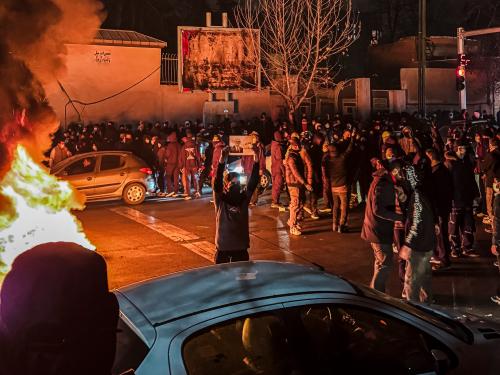Shibley Telhami holds the Anwar Sadat Chair for Peace and Development at the University of Maryland, College Park.
The sudden collapse of the Camp David summit has greatly increased the chance of violence in the Middle East, despite the significant progress on a number of difficult issues that have separated Israelis and Palestinians for a half-century.
If a chance exists to salvage a peaceful accord before a unilateral Palestinian declaration of statehood, American politicians—especially presidential candidates, who have behaved responsibly during the summit—must resist the temptation to blame one side or the other as they approach their national conventions. There will be enough of the blame game in the public discourse here and in the Middle East to endanger the prospects of a future deal.
Both sides still have overriding interests in avoiding violence and concluding an agreement, and they may still have time to try to revive the talks. But their opposition at home may not allow them much room to maneuver.
In their need to exploit the hero’s welcome at home for holding firm, Israeli Prime Minister Ehud Barak and Palestinian leader Yasser Arafat will inevitably highlight the other side’s shortcomings. In this game, there will be no winners.
Mr. Arafat will be taunted by Hamas. As soon as news of the summit’s failure arrived, one of Hamas’ leaders demanded that Mr. Arafat “give Hamas a five-year chance to work its jihad [holy war] and resistance. Within five years Hamas will be able to achieve gradual liberation of all of Palestine.”
Mr. Barak will be taunted by his right-wing to abandon future talks, especially if Hamas succeeds in carrying out any attacks.
Certainly, Mr. Barak has been courageous, both politically and personally, in offering more concessions than any Israeli has ever offered before. Mr. Arafat has also reportedly offered significant concessions on central issues such as refugees and Jewish settlements, for which he stood to face passionate opposition.
Competing to criticize Mr. Arafat in the American political campaign for holding firm on Jerusalem will only accelerate his move to unilateralism.
Although Mr. Arafat has set Sept. 13 as his deadline for declaring a state, he left himself a loophole by getting the Palestine Liberation Organization’s central committee to give him the right to declare any time after that deadline but before the end of the year.
His incentive to postpone until after November was clear: avoiding antagonizing the United States during the presidential campaigns, which would surely make him a favorite target of George W. Bush and Al Gore. If the anti-Arafat rhetoric escalates now, his response to Hamas’ criticism will be to accelerate the timetable for declaring a state.
Israel’s response will almost certainly be harsh, setting the stage for events that neither Mr. Barak nor Mr. Arafat can control.
Much at stake
President Clinton cannot be faulted for his extraordinary efforts to clinch a deal; had he not done so, the gap between the parties would not have narrowed and an agreement would certainly not have materialized in any case.
But there is a need for some serious assessment of why the Palestinian position on Jerusalem was so mis-perceived.
There is a great deal at stake for the U.S.
Palestinian-Israeli violence could spill over to other areas. Fortunately, the Lebanese-Israeli front has been relatively peaceful since the Israeli withdrawal in May, but it is doubtful that this would continue if Palestinian-Israeli violence escalates. The consequence would almost certainly draw Syria into the picture.
Having made Jerusalem the issue over which the summit collapsed, Mr. Arafat will now draw more Arab and Islamic support than he has witnessed in years. The stakes for the U.S. are thus very high.
Assuming that American interests are best served by maximizing the chance of another round of negotiations before September, the best service that Washington can provide is to refrain from a blame game in which everyone will be a loser.
The Brookings Institution is committed to quality, independence, and impact.
We are supported by a diverse array of funders. In line with our values and policies, each Brookings publication represents the sole views of its author(s).



Commentary
Op-edAvoiding Blame in Mideast Summit
July 27, 2000